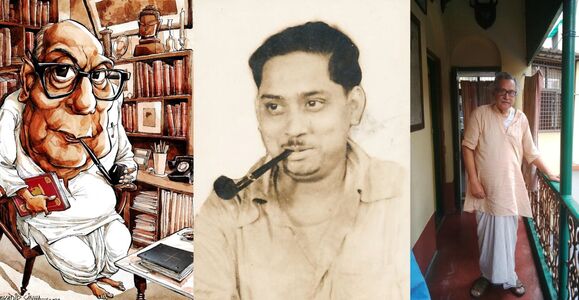
Nirmal Chandra Kumar, my father was an antiquarian. He had a large collection of books, maps, prints in his collection, through which he delved throughout the day. His friends, Radha Prasad Gupta, Satyajit Ray, Shanti Chowdhury, Vasant Choudhuri and others visited him for a session of ‘adda’ in the evening where books, among other subjects were discussed. Among the visitors was a young gentleman, Parimal Ray.
I had the occasion to meet him and talking about my father he described him as: ‘the patron saint of staying at home and doing nothing’. He said this was coined by, none other than, R P Gupta, who has described him at length in his book ‘Stan Kal Patra’.
R P Gupta in his writing has mentioned that Satyajit Ray modelled the character, 'Shidhu Jyatha' on my father who had an encyclopedic knowledge on many subjects. History, Art, Archaeology, Ornithology, Botany, Travel, Wildlife, Religion, Anthropology, Linguistic and many more. His vast knowledge came from his collection of books which he housed in a well-appointed library at his home in Taltala.
But no description fits him as well as that published in The Telegraph recently: Shidhujyatha’s revulsion to leave home. Shidhujyatha’s grouse lies elsewhere: that people wish to travel in the first place. For Shidhujyatha is the foremost, albeit fictional, advocate of the concept of 'Manas Bhraman', armchair travel. In Sonar Kella, the film, not the book, he tells Felu and Topshe that even though he could have done many things, he chose to do nothing; instead, he sits, motionless, with the proverbial windows to his soul open to let in light and air. This description fits no other person than my father.
Parimal Ray said, unlike other people who had a profession: like film making, acting, public relation, writing; Nirmal Chandra Kumar was famously averse to working. He moved to Taltala from his ancestral home in Mohan Bagan Row around 1940, and became one of Calcutta’s most distinctive personalities, with his defiant arrogance, his devotion to pipe and cigar, his trademark ensemble of white half shirts, dhoti and custom-made Chinese pump shoe.
Soon after he built his collection and lorded over his well-appointed library where he spends the whole day. It is here that he developed his art of inactivity. He was not a model of productivity in the sense that other people worked for a living whereas he did not. But this did not stop him from expounding. He had an opinion about everything, and damn if he opened his mouth without being asked.
In fact, for long, I did not know what my father did for a living. The whole day he would spend time in his library rummaging through antique books, maps and prints and then just sit smoking his pipe doing nothing. In the afternoon he would take a siesta, get up to paste newspaper cuttings in thick bound volumes which he called 'guard books'. In fact, it is this habit of collecting newspaper cuttings that drew him to a Scrap Book on the Mutiny of 1857 which came up in an auction in Sotheby’s. He bid for the book and purchased it paying a handsome amount of £100, quite a high price in those days, for his friend Satyajit Ray who was then planning a film on the subject, Satranj ki Khilari. According to R.P.Gupta, a close friend, Ray did not forget this gesture and also the fact that Kumar had always helped him with books and innumerable information and facts, and paid him his biggest personal tribute. He based one of his characters in his story book series on Feluda, the detective, etched on Kumar. R.P comments that the character Shidhujyatha (Sidhuuncle) in the Feluda series, with an encyclopaedic knowledge immortalizes Kumar, who had a vast knowledge on many subjects. Incidentally, in his book, 'Stan Kal Patra', both Kumar and Sidhujata has been compared with another well-known Bibliophile, none other than Jorge Luis Borges.
As for me, in my school Don Bosco, in the primary section we would be asked by the teacher to go up to the front of the class and narrate ten lines on your father: I would lie and say that my father is a professor because that is the nearest image that was close to my father. I say nearest, as, can you imagine a stocky man, in a white collared shirt, half-sleeved, and a dhoti smoking a pipe or a Davidos cigar sitting in his library surrounded by books the whole day doing nothing. But his friends have argued that Nirmal Chandra Kumar alias, Shidhujyatha was making a case for a cerebral life of immobility.
My father, Shidhujyatha would have certainly found a kindred spirit in Immanuel Kant. The philosopher was never spotted too far away from his birthplace, Königsberg; he insisted that he had no time for travel since there was so much to learn , seated, about the world. This League of Anti-travellers should also include Joseph Hall, the pioneer of armchair travel writing, whose satirical and dystopian Mundus Alter et idem (Another World, and Yet the Same) can be read as a vicious spoof of The Travels of Sir John Mandeville. An eighteenth-century Frenchman can also be counted as the League’s honourable patron. Xavier de Maistre, Allen de Botton writes in an engaging article in Financial Times, most recently, had locked himself up in a room to study the ‘enchanting’ objects that lay closest to him. The result of his discoveries was wonderful: A Journey Around My Room — a travelogue that involved Xavier de Maistre ‘journeying’ from the bed to the sofa.
But the armchair traveller need not cover short distances only. Indeed, the armchair has helped the mind cross the veritable twenty thousand leagues, thereby serving as the allegorical pen that created canonical works in literature. Around the World in Eighty Days was written without Jules Verne having to circumambulate the planet. Rudyard Kipling could materialize “Mandalay” without stepping foot in that country. Then there is Chander Pahar, a rich, almost ethnographic, account, even though the distance between Africa and Bibhutibhushan Bandyopadhyay village was infinite.
The 1650s, French philosopher and mathematician Blaise Pascal jotted down one of the most counterintuitive aphorisms of all time: ‘The sole cause of man’s unhappiness is that he cannot stay quietly in his room.’ My father quoted this often with a smile through his pipe with eyes glittering.
But whatever be the guise of the traveller: crusader, king, merchant, explorer, slave-trader, empire-builder, those with roving eyes have ended up transforming, usually for the worse, the very world that they had sought to wander in. Now, the world has struck back in vengeance forcing humanity back to the armchair.
~
Paimal Ray told me that his uncle Sisir Mukherjee, a judge at Calcutta High Court lived two houses away from us. Whenever he visited his uncle, he would have a glimpse of my father’s friend who visited his library. He said that occasionally he would peep in to have a glimpse of miles of vellum and leather bound books standing in the shelves. It was Radha Prasad Gupta who introduced him to my father.
Parimal Ray is a rare collector who scoured the streets of Calcutta, fairs, markets and even junkyards in order to collect rare objects and popular ephemera. Parimal Ray’s eclectic collection comprises of popular paintings and prints, matchbox labels, publicity material, cinema posters and booklets and the exceptional item of street hoardings and signboards.
To Check Video Click here :Nirmal Chandra Kumar. Reminiscence. Parimal Ray.
